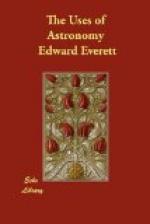first geological survey was undertaken, on this side
of the Atlantic, and, perhaps, the world.
This was in 1820, and ordered by that eminent
philanthropist, Stephen Van Rensselaer, who, three
years later, appointed Prof. Eaton to survey,
in like manner, the whole region traversed by
the Erie Canal. This was the commencement
of a work, which, during the last thirty years, has
had a wonderful expansion, reaching a large part of
the States of the Union, as well as Canada, Nova
Scotia, and New Brunswick, and, I might add,
several European countries, where the magnificent
surveys now in progress did not commence till after
the survey of Albany and Rensselaer Counties.
How glad are we, therefore, to find on this spot
the first Museum of Economical Geology on this
side of the Atlantic! Nay, embracing as
it does all the department of Natural History, I see
in it more than a European Museum of Economical
Geology, splendid though they are. I fancy,
rather, that I see here the germ of a Cis-Atlantic
British Museum, or Garden of Plants.
North Carolina was the first State that ordered a geological survey; and I have the pleasure of seeing before me the gentleman who executed it, and in 1824-5 published a report of 140 pages. I refer to Professor Olmstead, who, though he has since won brighter laurels in another department of science, will always be honored as the first commissioned State geologist in our land.
Of the New York State Survey he said:—
This survey has developed the older fossiliferous rocks, with a fullness and distinctness unknown elsewhere. Hence European savans study the New York Reports with eagerness. In 1850, as I entered the Woodwardian Museum, in the University of Cambridge, in England, I found Professor McCoy busy with a collection of Silurian fossils before him, which he was studying with Hall’s first volume of Paleontology as his guide; and in the splendid volumes, entitled British Paleozoric Rocks and Fossils, which appeared last year as the result of those researches, I find Professor Hall denominated the great American Paleontologist. I tell you, Sir, that this survey has given New York a reputation throughout the learned world, of which she may well be proud. Am I told that it will, probably, cost half a million? Very well. The larger the sum, the higher will be the reputation of New York for liberality; and what other half million expended in our country, has developed so many new facts or thrown so much light upon the history of the globe, or won so world-wide and enviable a reputation?
And of Geological Surveys in general:—




